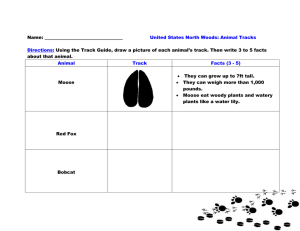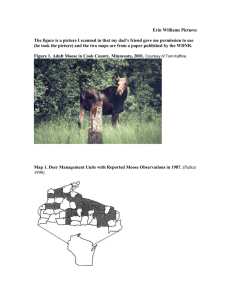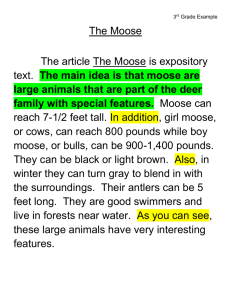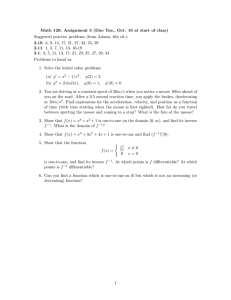North American Moose, by R.L. Peterson - arctic
advertisement
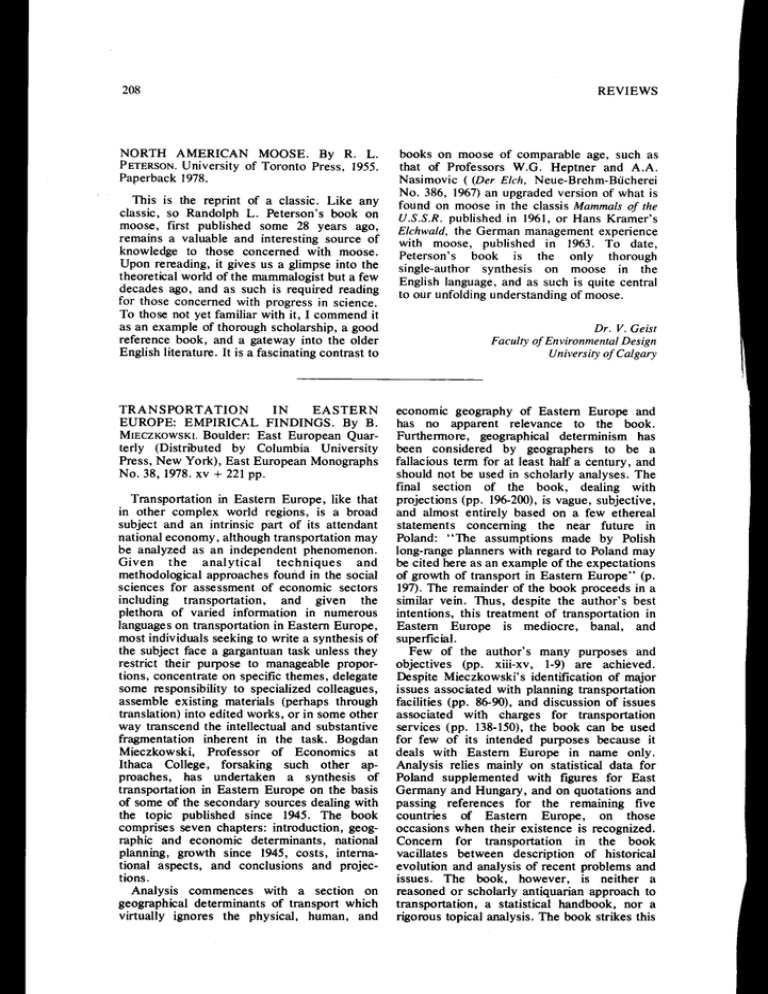
208 NORTH AMERICAN MOOSE. By R.L. PETERSON. Universityof Toronto Press, 1955. Paperback 1978. This is thereprint of aclassic.Likeany classic, so Randolph L. Peterson’s book on moose, first publishedsome 28 yearsago, remainsavaluableandinterestingsource of knowledgeto thoseconcerned with moose. Upon rereading, it gives us a glimpse into the theoretical worldof the mammalogist but a few decades ago, and as such is required reading for those concerned with progress in science. To those not yet familiar with it, I commend it as an example of thorough scholarship, a good reference book, and a gateway into the older English literature. It is a fascinating contrastto REVIEWS books on moose of comparableage,suchas that of ProfessorsW.G.HeptnerandA.A. Nasimovic ( (Der Elch, Neue-Brehm-Bucherei No. 386, 1967) an upgraded version of what is found on moose in the classis Mammals of the U.S.S.R. published in 1961, or Hans Kramer’s Elchwald, the German management experience date, with moose, published in 1963. To Peterson’s book is only the thorough on moose in the single-author synthesis English language, and as such is quite central to our unfolding understanding of moose. Dr. V . Geisr Faculty of Environmental Design University of Calgary TRANSPORTATION EASTERN IN economicgeography of EasternEuropeand EUROPE EMPIRICALFINDINGS. By B. has no apparent relevance to the book. MIECZKOWSKI. Boulder:EastEuropeanQuarFurthermore, geographical determinism has terly (Distributed by Columbia University been considered by geographers to be a Press, New York), East European Monographs fallacious term for at least half a century, and No. 38, 1978. xv + 221 pp. should not be used in scholarly analyses. The final section of the book, dealing with Transportation in Eastern Europe, like that projections (pp. 1%-200), is vague, subjective, in othercomplex world regions, is abroad on afewethereal andalmostentirelybased subjectand an intrinsicpart of its attendant statements concerning the near future in national economy, although transportationmay Poland:“Theassumptionsmade by Polish beanalyzed as an independentphenomenon. long-range planners with regard to Poland may Given the analytical techniques and be cited here as anexample of the expectations methodological approaches found in the social of growth of transport in Eastern Europe’’ (p. sciences for assessment of economicsectors 197). The remainder of the book proceeds in a including transportation, and given the similarvein. Thus, despitetheauthor’sbest plethora of variedinformation in numerous intentions, this treatment of transportation in languages on transportation in Eastern Europe, Eastern Europe is mediocre, banal, and most individuals seeking to write a synthesis of superficial. the subject face a gargantuan task unless they Few of theauthor’smanypurposesand restricttheirpurposetomanageableproporobjectives (pp. xiii-xv, 1-9) are achieved. tions, concentrate on specific themes, delegate Despite Mieczkowski’s identification of major someresponsibility to specializedcolleagues, issues associated with planning transportation assembleexistingmaterials(perhapsthrough facilities (pp. 86-90), and discussion of issues translation) into edited works,or in some other associated with charges for transportation way transcend the intellectual and substantive services(pp. 138-150), thebookcan be used fragmentationinherent in thetask.Bogdan for fewof its intendedpurposesbecause it Mieczkowski, Professor of Economics at dealswithEasternEuropeinnameonly. Ithaca College, forsaking such other apAnalysis relies mainly on statistical datafor a synthesis of Polandsupplementedwith proaches, has undertaken faures forEast transportation in Eastern Europe on the basis Germany and Hungary, and on quotations and of some of the secondary sources dealing with passing references for the remaining five 1945. The book the topic published since on those countries of Eastern Europe, comprises seven chapters: introduction, geog- occasions when their existence is recognized. raphicandeconomicdeterminants,national Concern for transportation the in book 1945, costs, interna- vacillatesbetweendescription planning,growthsince of historical tionalaspects,andconclusionsandprojecevolution and analysis of recent problems and tions. issues. The book, however, is neither a on reasoned or scholarly antiquarian approach to Analysis commences with section a geographical determinants of transport which transportation,a statistical handbook,nora virtuallyignoresthephysical,human,and rigorous topical analysis. The book strikes this
